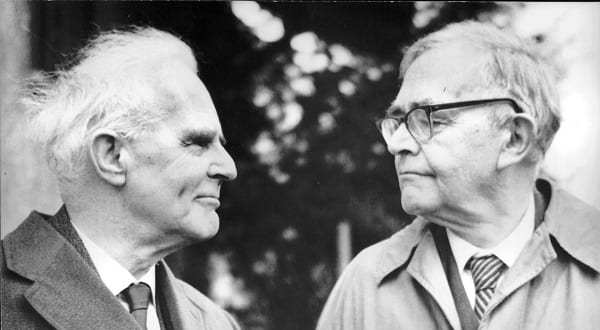
Jason Micheli is my closest frenemy who isn’t openly Calvinist. I love Jason, but sometimes he writes blog posts that provoke me to send him virulently profane text messages. More than once, it’s happened in the middle of my son’s Saturday soccer games which usually put me in an extra salty mood. The vast majority of Jason’s theology is similar to mine; he’s been a tremendous influence on me. But his most recent take on our denomination’s sexuality debate compels me to take as strong an exception as Karl Barth took to Emil Brunner’s natural theology.
First, I should say that I agree absolutely with the main thrust of Jason’s piece “Grace Gives Us The Right To Be Wrong.” The greatest freedom that God’s grace affords us is the freedom to be wrong. Humanity’s toxic need for self-justification is what makes sin such a powerful prison. When we need to be right, we try to justify all of our mistakes and immunize ourselves against any possibility of repentance and spiritual growth.
By absorbing the wrath of judgment against our sin on his cross, Jesus unilaterally justifies us so that we no longer have the existential need to be correct in our theology and morality. The chief problem with evangelical Christian theology is because they see the cross as an intra-Trinitarian transaction between the Son’s sacrifice and the Father’s judgment of our sin, they don’t recognize our self-justification as the primary enemy whose ransom needs to be paid by the cross. This is why many evangelicals remain unsaved from their self-justification and instead seek to justify themselves through correct theology.
And to be fair, as Jason would point out, progressive Christians often fail to grab hold of Christ’s justifying grace and seek to justify themselves through wokeness about as fiercely as evangelical Christians seek to justify themselves through orthodoxy. To some degree, they are mirror images of one another, but not entirely. Evangelical Christians standing up for tradition and scripture are analogous to progressive Christian allies standing up for marginalized people. And it should be said of course that zeal for preserving Christian orthodoxy and solidarity for marginalized people are both genuine and valid and should not be waved off just because of the inherently intertwined self-justification.
But marginalized Christians standing up for themselves are doing something very different theologically. Learning that you are not cursed and accepting yourself as a beautiful and beloved child of God may seem like another variation of self-justification but saying with confident self-love, “I am not an abomination” is completely different than saying, “See, I’m right.” What happens when marginalized Christians love and stand up for themselves the first time is a different variation of the justifying grace that helps self-righteous Christians let go of the self-hatred that manifests as a zeal for correctness.
One of the major differences between Jason’s vantage point and my own is that Jason converted to Christianity as a high school senior in a mainline church after which he got taken under the wings of powerful, brilliant theologians like John Milbank, David Bentley Hart, Scot McKnight, and Stanley Hauerwas, all of whom made him the adorably sassy Barthian he’s become. My theological formation is that I grew up Southern Baptist, got pushed out of leadership in my evangelical college ministry, and several years later walked into a queer Methodist church as a deeply troubled young adult, where I read Henri Nouwen’s Life of the Beloved with a small group of sixty-year old lesbians. Neither is better, just different.
I had the unique experience of being discipled by queer Christians who exuded grace more purely than any other Christians I’d encountered before, which I interpreted to be a product of the persecution they had suffered. So my theological journey has always been centered around trying to figure out how to reproduce whatever was in the air at Central Avenue United Methodist Church in Toledo, Ohio, where God told me so richly and beautifully that I was his beloved son and that he could turn the brokenness of my depression into the chosenness of his call.
Because God transmitted his justifying grace to me through a queer Methodist church, I experience any attack on queer Christians as an existential threat to my salvation story. If the God who spoke so tenderly to me when I was reading Henri Nouwen with the lesbians is a fraud and the God the evangelicals proclaim is the real God, then my entire adult life has been a waste. That doesn’t give me the right to silence people from disagreeing with me. It does mean that I can’t be quiet when I think someone is throwing queer Christians under the bus.
In 1973, when Cesar Chavez was trying to organize the farmworkers in Coachella valley, California (where the hipster music festival is now held), the white-led Teamsters union swooped into town and negotiated a sweetheart union contract with the farmers on behalf of Cesar Chavez and his fellow farmworkers against their will. That was the image that came to my mind when I read this passage from Jason’s blog post:
I understand those Christians who advocate for a traditional view of sexuality and marriage. I empathize with those who critique the nihilistic sexual ethics of our culture, worry about its cheapening of sex and the objectification of bodies, and its devaluing of tradition, especially the traditional authority of scripture in the life of the Church. Such traditionalists are correct to insist that the male-female union is the normative relationship espoused by the Church’s scripture and confession. They’re right to remind us that neither scripture nor tradition in any way condones homosexual relationships.
I don’t disagree with them that in a Church which took centuries to codify what we meant by ‘Trinity’ or ‘Jesus as the God-Man,’ it’s a bit narcissistic to insist the Church rush headlong into upending millennia of teaching on sexuality and personhood. I sympathize with their critique that, in many ways and places, the Church has substituted the mantra of inclusivity for the kerygma about Christ and him crucified.
To be fair, Jason has never made any claim to be an ally to queer Christians. So as much as I’m enraged that he’s waving a white flag on their behalf and facilely dismissing the entire argument for biblically grounded sexual inclusivity whose compilation has been a major part of my adult spiritual journey, he never said he was on our side. Still, it should be understandable that I’m going to hit back hard when I think he’s being theologically sloppy.
This is what Jason has to say in “support” of the queer side of the debate:
On the other side of the debate, frankly it makes no sense to me to baptize babies if the Church is not prepared for them to exercise their Christian vocation once they’re grown, and ordained ministry and marriage are but two forms that Christian vocation takes. If we’re not prepared for gay Christians to live into their baptism as adults we shouldn’t be baptizing them as babies, which means we shouldn’t be baptizing any babies.
If Jason is right in his view that scripture specifically prescribes heteronormativity as a permanent Christian value and that it’s “narcissistic” to “rush headlong” into embracing queer inclusion because it took a few centuries to figure out Christology, then his anemic argument to justify queer weddings and ordained ministry on the basis of their baptism fails utterly.
Jason effectively erases the concern of holiness and sanctification from the debate, which ironically puts me on the same side as the evangelicals who would oppose his position, because I believe that holiness matters, a lot. And that our salvation through sanctification is not unimportant. The following passage is such a beautiful train-wreck of good and bad theology:
More than the ‘right’ position on sex, I care more about people knowing that God gave himself for them in spite of them; therefore, God literally doesn’t give a @#$ about the content or the character of their lives. God’s grace, as Robert Capon said, isn’t cheap. It isn’t even expensive. It’s free.
I fear our fighting over sexuality conveys the same message the sale of indulgences did on the eve of the Reformation: that God’s grace isn’t costly. It’s expensive, paid in the tender of your right-living and right-believing. Maybe the way forward is the backward.
When Jason says God doesn’t give a shit/fuck/damn about the content and the character of our lives, he’s speaking of God’s capacity as a prodigal judge who justifies sinners scandalously. But God is not merely a judge; he’s a Father. He yearns for me not to lose my sobriety, yell at my children, or engage in blasphemous, cynical behavior with infinite more passion than I have as a soccer dad yelling for my son to boot the ball downfield.
Sometimes, he jumps up in the air so high when I score a spiritual victory that he spills his drink; other times he rips his hair out when I completely miss the ball. At least, I hope he does, because if I never infuriated him, it would mean that his love was more like a vague, banal omnidirectional glow than a fierce, raging fire that can fill my heart with euphoric glory when I surrender myself to it.
Justification is not the only game in town. God tells us through Jesus’ cross to stop worrying about earning our salvation so that we can discover the joy of embodying his love in lives of repentance and discipleship. In that basic theological formulation, I should be 100% in line with evangelical Wesleyans.
My debate with the conservative evangelicals about sexuality has to do with what holiness means and why holiness matters, because holiness matters a lot. Maybe Jason’s solo justificatio gospel works for Lutherans, but in the Wesleyan tradition, we believe that God’s grace is about so much more than not getting fried in hell; we believe that we can gobble up more and more of it through engaging in the means of grace. We believe that our purpose as disciples is to be perfected in love.
So yes, it’s true that our United Methodist sexuality debate would be a lot more gracious if nobody involved were trying to justify themselves through theological or political correctness. But that doesn’t cast aside the question of whether letting partnered queer people become pastors or get married is an obstacle to their perfection in love.
To me, the Wesleyan tradition is clear: the purpose of holiness is to be perfected in love and we should interpret scripture as though that is the reason for every exhortation about moral behavior. I have said before that the apostle Paul has to be rolling over in his grave every time his pastorally contextual exhortations are turned into abstract legalisms when he said very clearly that what he cares about is doing whatever leads to good spiritual fruit rather than fruits of the flesh (Galatians 5:19-22).
Do women need to keep silent (1 Corinthians 14:34) and cover their heads in church (1 Corinthians 11:5) to gain good spiritual fruit that perfects them in love? No? Well, that’s why most Wesleyans don’t make our women do that. And even though Paul says “the husband is the head of his wife” (1 Corinthians 11:3), most Wesleyans don’t preach that from the pulpit because that kind of patriarchy turns out to enable abuse and hinder perfection in love.
What I have consistently asked the traditionalists to show me is why the apostle Paul’s pragmatic stance that “it is better to marry than to burn with passion” (1 Cor 7:9) cannot possibly apply to queer people. Not through dropping unprocessed proof-texts. But by showing how church-sanctioned marriage harms queer Christians in their quest to be perfected in Christian love. Is it pragmatically beneficial to the sanctification of queer Christians to have church-sanctioned covenantal partnerships within which to be sexually intimate? Or are they more likely to gain patience, joy, kindness, generosity, etc, without the possibility of marriage?
I realize that Jason has preached a sermon on how Galatian 5’s spiritual fruit is God’s work, not ours. Yes, amen. But the apostle Paul in the same passage exhorts us to “walk by the spirit.”
You, my brothers and sisters, were called to be free. But do not use your freedom to indulge the flesh; rather, serve one another humbly in love. 14 For the entire law is fulfilled in keeping this one command: “Love your neighbor as yourself.” 15 If you bite and devour each other, watch out or you will be destroyed by each other.
16 So I say, walk by the Spirit, and you will not gratify the desires of the flesh. 17 For the flesh desires what is contrary to the Spirit, and the Spirit what is contrary to the flesh. They are in conflict with each other, so that you are not to do whatever you want. 18 But if you are led by the Spirit, you are not under the law. [Galatians 5:13-18]
Notice that this passage isn’t just about a duality between law and grace. The primary duality is between spirit and flesh. Now this is where some exegetical mischief happens, because some Christians would say that gay people are inherently gratifying the flesh if they have sex (which straight people apparently aren’t doing if they have sex inside of marriage). Indeed, Augustine would say that straight people are gratifying the flesh when they have sex even inside a marriage, which is why the Roman church taught for centuries that sex was a necessary evil for the sake of procreation that became sinful if it deviated from that purpose.
This is where we have to go back to 1 Corinthians 7. Paul wishes everyone could be like him (1 Corinthians 7:7), a radical celibate ascetic who has incredible mystical divine encounters (2 Cor 12), but he understands that everyone’s body that isn’t specifically gifted for and called to celibacy has a valid need for sex, and he prescribes marriage as a pragmatic solution to that. According to 1 Corinthians 7:9, marriage is not merely sacramental; it is also pragmatic.
It’s important to understand that “the flesh” (sarx) is not the physical body (soma) as such. We do not “gratify the flesh” by eating when we’re hungry or having sex when we’re horny. We “gratify the flesh” when we allow our appetites to become addictions that rule and dehumanize us. As Paul says, ““All things are lawful for me, but not all things are beneficial. All things are lawful for me, but I will not be dominated by anything” (1 Corinthians 6:12, without the theological edits that aren’t in the Greek). His morality is plainly a pragmatic virtue ethic, not an authoritarian deontological ethic (for those of you who speak that language).
Even after we discover that we’re under God’s mercy and don’t need to prove or earn anything, the journey of “work[ing] out [our] salvation with fear and trembling” doesn’t stop (Philippians 2:12). We must continuously discern between the pulls of the spirit and the pulls of the flesh. Even though God does the work of sanctification in us, we avail ourselves of the means of grace and seek to walk by the spirit.
I also believe that our self-justification never stops trying to reassert itself. We must continuously rededicate ourselves to trusting God’s righteousness over ours. So in many ways, I agree with Jason and applaud his passion for trying to help self-righteous progressives and conservatives let go of their need to be right, but he’s not allowed to surrender the Bible on behalf of queer Christians as a rhetorical maneuver.
Justification doesn’t make holiness a moot point. Holiness is perfection in love. The queer United Methodists discipling me throughout my life’s spiritual journey have shown that to me more than anyone.
Check out my book How Jesus Saves the World From Us: 12 Antidotes to Toxic Christianity!
If you’d like to support our inclusive United Methodist campus ministry in the Deep South during a difficult season for our denomination, you’re invited to do so as a one-time donor or monthly patron.












